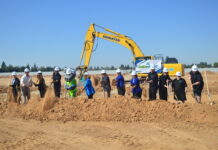
President Donald Trump declared he is making good on his promise to increase water supply for Central Valley farmers when he visited Bakersfield Feb. 19.
The visit took place a day after the Bureau of Reclamation finalized a plan that would roll back environmental restrictions to allow Delta pumps to send millions of gallons of water to farmers throughout the Central Valley.
“A major obstacle to providing water for the region’s farmers has now been totally eliminated by the federal government,” Trump told a crowd of supporters at an airfield in Bakersfield, where he was accompanied by Rep. Devin Nunes and House Minority Leader Kevin McCarthy.
The Wetlands Water District, which provides water services to farmers in western Fresno and Kings Counties, said in a statement that the south-of Delta Central Valley Water Project would receive 15 percent of the water allocated by the Bureau of Reclamation.
“Today the Bureau of Reclamation announced that the initial 2020 allocation for south-of-Delta Central Valley Project (CVP) agricultural water service contractors is 15%. Needless to say, Westlands Water District wishes it were higher, and the District is confident that Reclamation would have provided a higher allocation if existing conditions would have allowed it,” the district said.
The district said the 15 percent allocation is good news, as it expects 2020 will ultimately be classified as a dry or critical year.
It said 2020 will be similar to 2009, a critically dry year, in terms of precipitation. The district received a 10 percent allocation in 2009.
Gov. Gavin Newsom filed a lawsuit against the Trump administration a day after the visit, saying the water plan will put vulnerable fish populations at severe risk.
The Governor may still come to a compromise with the President, however, as he sent a letter to Interior Secretary David Bernhardt saying, “We remain committed to working to resolve these remaining differences in (the) coming weeks and months.”
It is unclear what will happen in the following months, as Newsom’s lawsuit will likely slow down the process of the new plan going into effect.
California may have to wait until the November presidential election to find out.









